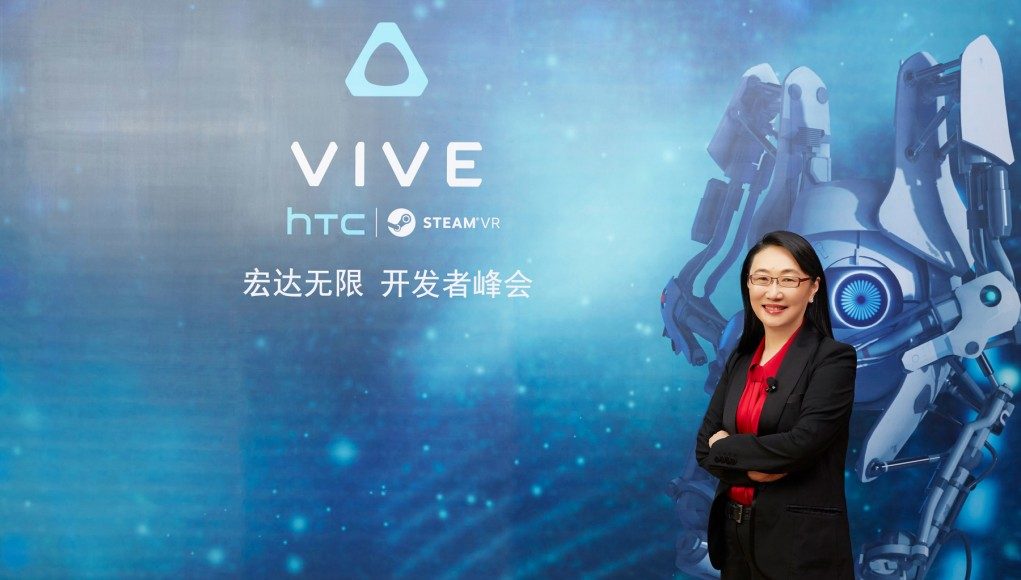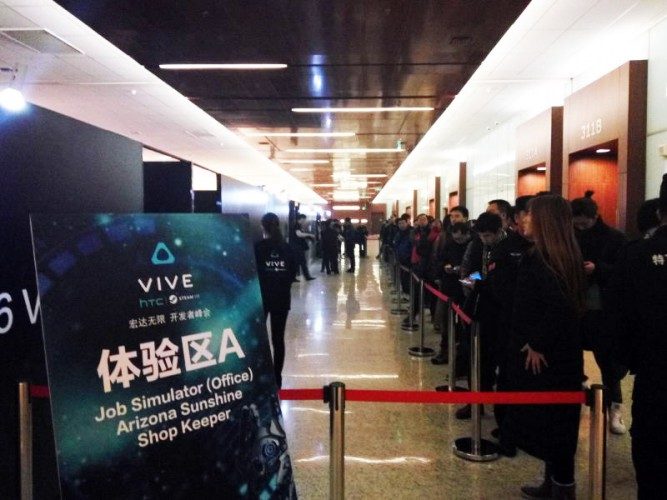HTC formally debuted the Vive VR headset to Chinese developers at a packed event last Friday in Beijing, China. The event featured speakers from HTC, Valve, and notable developers working with the Vive. One of the announcements to come from the event was a partnership to bring arcade-like Vive stations to China’s massive internet café market.
Guest article by Christian Grewell & Vincent Chen
 Christian is a Professor at NYU Shanghai where he teaches and researches in the areas of digital media, fabrication and entrepreneurship. In addition, he is working on a number of projects to realize virtual reality’s potential to transform education.
Christian is a Professor at NYU Shanghai where he teaches and researches in the areas of digital media, fabrication and entrepreneurship. In addition, he is working on a number of projects to realize virtual reality’s potential to transform education.
 Vincent is the co-founder of Tianshe Media and a Chinese game developer and VR evangelist in Shanghai. He and his team are working on a VR adventure game called Weeping Doll, and also operate a Chinese VR game community.
Vincent is the co-founder of Tianshe Media and a Chinese game developer and VR evangelist in Shanghai. He and his team are working on a VR adventure game called Weeping Doll, and also operate a Chinese VR game community.
The HTC ‘Vive Unbound’ event featured 12 Vive demo stations in addition to talks by Chet Faliszek (Valve), Katsuhiro Harada (Bandai), Neville Spiteri (WEVR), Eric Darnell (Baobab Studios) and Cher Wang, HTC’s CEO, who hinted at “a very, very big technological breakthrough” with the Vive
HTC announced a partnership with Hangzhou-based ShunWang Technology, Inc (顺网科技), one of China’s largest internet café software providers. The pilot program, underway in Hangzhou, allows players to purchase 10 minutes in a specialized Vive room for 10 – 30RMB ($2 – $5).
“The sustainable development of VR gaming needs hardcore gaming, which is mainly supported by Internet café platforms,” said Hua Yong, Chairman of ShunWang. “As the biggest Internet café platform service provider in China, Shunwang will make full use of its existing network and operation capacity in the industry to bring the best VR experience to hundreds of millions of Internet café game players.”

ShunWang Tech’s software is used in more than 100,000 internet cafés in China, about 70% of the market, and the company claims their software serves says more than 100 million internet café users. That’s a large addressable market, though it’s hard to say at beginning how many of those 110,000 will have Vive zone installed. ShunWang Tech is of course hoping to persuade their partner internet cafés that the Vive zone is a profitable project, or at least it will attract more users than cafes without it.
The announcement says ShunWang Tech will be the exclusive partner deploying the Vive in Chinese internet cafés. HTC will develop the Launcher for the Vive, but ShunWang Tech will handle the billing, content management system, and the daily operation of the Vive zone.
At the Beijing Vive event, more than 12 individual demo stations were opened up to allow participants to experience official demos, as well as original content created by Chinese VR development teams at TianShe Media, 51wofang, Transist VR Lab, TVR, Sureal and Shaderealm.
From the perspective of the Chinese developers in attendance, the biggest news from the event was the announcement of the HTC Vive Store and plans to setup an Apple Store-like eco-system. Vive developers can submit their games and experiences to the HTC Vive store for approval and distribution. There were no further details concerning how the store would operate, including the royalty payments, though it appears there will be DRM requirements in order to participate.
See Also: $50M VR Venture Fund Announced by Japanese Mobile Game Giant COLOPL
VR as a new medium for game developers has been gaining steam in China, and the feeling on the ground at the event from Chinese media and developers was very positive, with many developers expressing interest in committing more resources to develop VR-only IP for the Vive and Rift.
Additional reporting thanks to Oval Po Liu of Yivian








